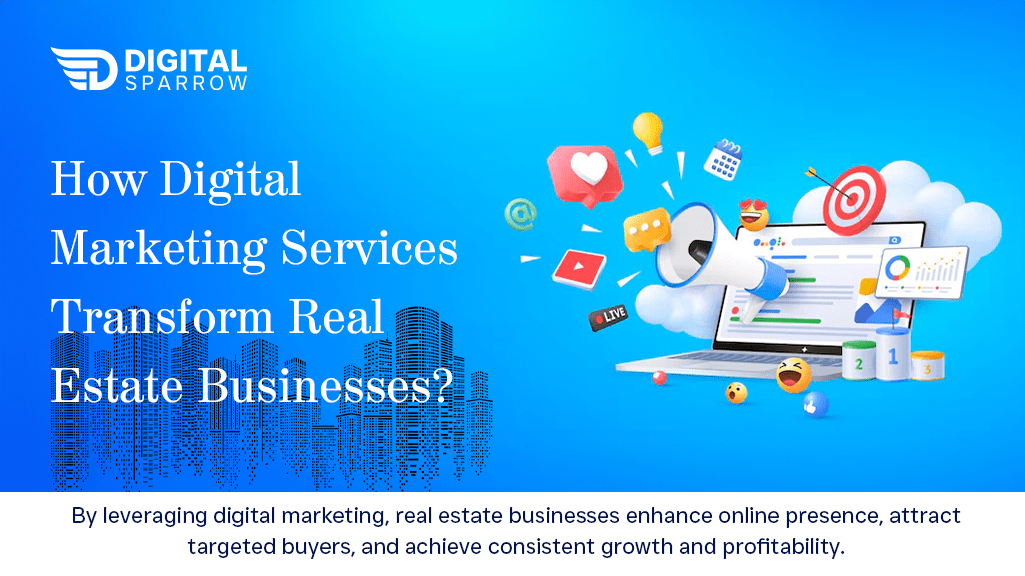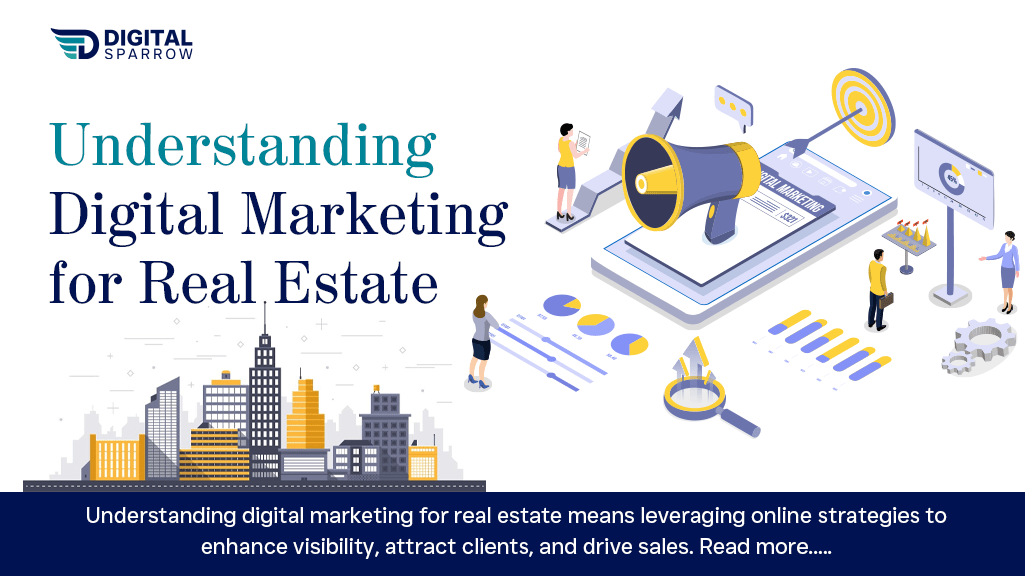Introduction
The real estate industry has undergone a significant transformation in recent years, driven largely by advancements in digital marketing. Traditional methods of advertising properties through print media and open houses are being complemented—and often replaced—by sophisticated digital marketing strategies. This shift has opened new avenues for real estate businesses to connect with potential clients, increase brand awareness, and drive sales. In this comprehensive guide, we will explore how digital marketing services can revolutionise your real estate business, covering essential strategies, tools, and best practices.
Understanding Digital Marketing for Real Estate
Digital Marketing for Real Estate encompasses a range of strategies and techniques designed to promote real estate businesses online. This includes everything from search engine optimisation (SEO) and content marketing to social media and email marketing. The goal is to enhance online visibility, attract potential buyers and sellers, and foster stronger relationships with clients.
The significance of digital marketing in the real estate sector cannot be overstated. Traditional marketing methods, such as print ads and billboards, are no longer sufficient in an increasingly digital world. Today, potential buyers and sellers turn to the internet to search for properties, research real estate agents, and gather information. As such, having a robust digital marketing strategy is essential for real estate businesses to stay competitive.
Key Digital Marketing Strategies for Real Estate
- SEO for Real Estate Agents: SEO is the foundation of any successful digital marketing strategy. By optimising your website for search engines, you can increase organic traffic and improve your search engine rankings. This involves using relevant keywords such as “Digital Marketing for Real Estate” and “Real Estate Marketing Strategies” throughout your website content, meta descriptions, and titles.
- Content Marketing: Creating valuable, informative content is crucial for attracting and retaining clients. This can include blog posts, articles, videos, and infographics that provide insights into the real estate market, tips for buying or selling properties, and other relevant topics. Content marketing helps establish your authority in the industry and build trust with your audience.
- Email Marketing: Email marketing remains a powerful tool for nurturing leads and maintaining relationships with past clients. By sending targeted, personalised emails, you can keep potential buyers and sellers informed about new listings, market trends, and other important updates. This helps keep your real estate business top-of-mind and encourages repeat business.
Social Media Marketing for Real Estate:
Social media platforms like Facebook, Instagram, and LinkedIn offer excellent opportunities for engaging with your audience and promoting your real estate business. By sharing high-quality images and videos of properties, success stories, and market updates, you can attract potential clients and drive traffic to your website. Social media marketing also allows for targeted advertising, enabling you to reach specific demographics and increase your chances of generating leads.
- Paid Advertising (PPC): Pay-per-click (PPC) advertising is a cost-effective way to drive targeted traffic to your website. By bidding on relevant keywords such as “Real Estate Marketing” and “Online Marketing for Realtors,” you can ensure that your ads appear at the top of search engine results pages. PPC advertising allows for precise targeting, enabling you to reach potential clients who are actively searching for real estate services.
Benefits of Digital Marketing for Real Estate Businesses
- Increased Visibility and Reach: Digital marketing allow real estate businesses to reach a wider audience than traditional marketing methods. With SEO, content marketing, and social media, you can attract potential clients from various locations and demographics, increasing your chances of generating leads and closing deals.
- Targeted Marketing: One of the key advantages of digital marketing is the ability to target specific audiences. Whether through social media advertising, PPC campaigns, or email marketing, you can tailor your messages to reach potential clients based on their interests, behaviours, and demographics. This ensures that your marketing efforts are more effective and yield better results.
- Cost-Effective Solutions: Digital marketing offers cost-effective solutions compared to traditional marketing methods. With the ability to track and measure your campaigns’ performance, you can allocate your budget more efficiently and make data-driven decisions to maximise your return on investment (ROI).
- Enhanced Customer Engagement: Digital marketing enables real estate businesses to engage with their audience in real time. Through social media interactions, email campaigns, and personalised content, you can build stronger relationships with potential clients, answer their queries, and address their concerns promptly. This level of engagement helps foster trust and loyalty, increasing the likelihood of successful transactions.
- Improved Lead Generation and Conversion: By leveraging digital marketing strategies, real estate businesses can generate high-quality leads and improve their conversion rates. SEO, content marketing, and paid advertising help attract potential clients who are actively searching for real estate services, increasing the chances of turning leads into actual buyers or sellers.
Case Studies: Success Stories of Real Estate Businesses
Case Study: Open Door Realtors
Open Door Realtors, a leading real estate agency, leveraged digital marketing services to transform their business. By implementing a comprehensive SEO strategy, they improved their website’s search engine rankings and increased organic traffic by 50%. Additionally, their content marketing efforts, including informative blog posts and market insights, helped establish their authority in the industry. Through targeted social media advertising, Open Door Realtors generated 30% more leads and achieved a 20% increase in property sales within six months.
Challenges and Solutions in Real Estate Digital Marketing
While digital marketing offers numerous benefits, real estate businesses may face challenges along the way. Some common challenges include:
- Competition: The real estate industry is highly competitive, making it essential to stand out from the crowd. To overcome this challenge, focus on creating unique, high-quality content and leveraging targeted advertising to reach your audience effectively.
- Keeping Up with Trends: Digital marketing trends and technologies are constantly evolving. To stay ahead, invest in continuous learning and stay updated with the latest industry developments. Attend webinars, read industry blogs, and participate in networking events to gain insights and stay informed.
- Measuring ROI: Measuring the ROI of digital marketing campaigns can be challenging. Utilise analytics tools to track and analyse your campaigns’ performance. Set clear goals and key performance indicators (KPIs) to evaluate your success and make data-driven decisions.
- Managing Online Reputation: Maintaining a positive online reputation is crucial for real estate businesses. Monitor online reviews and respond promptly to customer feedback. Encourage satisfied clients to leave positive reviews and address any negative feedback professionally and proactively.
Future Trends in Real Estate Digital Marketing
The future of real estate digital marketing looks promising, with several emerging trends set to shape the industry:
- Artificial Intelligence (AI) and Automation: AI-powered tools and automation can streamline marketing processes, personalise customer experiences, and provide valuable insights. Chatbots, for example, can assist with lead generation and customer support, enhancing overall efficiency.
- Virtual and Augmented Reality (VR/AR): VR and AR technologies are revolutionising property viewings. Virtual tours and augmented reality applications allow potential buyers to explore properties remotely, providing a more immersive experience and saving time for both buyers and agents.
- Video Marketing: Video content continues to gain popularity in digital marketing. Real estate businesses can leverage video marketing to showcase properties, provide virtual tours, and share client testimonials. High-quality videos help capture attention and engage potential clients effectively.
- Voice Search Optimisation: With the rise of voice-activated devices, optimising your content for voice search is becoming increasingly important. Focus on natural language and conversational keywords to ensure your real estate business appears in voice search results.
- Personalisation: Personalised marketing experiences are key to capturing and retaining clients. Utilise data and analytics to understand your audience’s preferences and behaviours, and tailor your marketing messages accordingly. Personalisation helps build stronger connections and increases the likelihood of conversions.
Conclusion
In conclusion, digital marketing services have transformed the real estate industry, offering businesses the tools and strategies to thrive in a competitive market. By leveraging SEO, content marketing, social media, and other digital marketing techniques, real estate businesses can increase their visibility, engage with potential clients, and drive sales. Embracing digital marketing is no longer an option but a necessity for real estate businesses looking to succeed in today’s digital age. As you implement these strategies and stay updated with emerging trends, your real estate business will be well-positioned for growth and success.



Keep up the fantastic work! Kalorifer Sobası odun, kömür, pelet gibi yakıtlarla çalışan ve ısıtma işlevi gören bir soba türüdür. Kalorifer Sobası içindeki yakıtın yanmasıyla oluşan ısıyı doğrudan çevresine yayar ve aynı zamanda suyun ısınmasını sağlar.